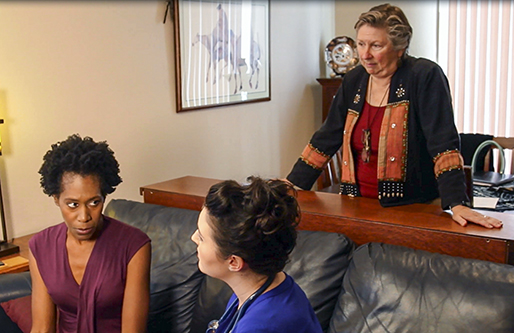Producing resources for family caregivers
School of Nursing researchers partner with AARP to develop videos
 Associate Dean for Academics Theresa Harvath, right, discusses caregiving skills with actors during a family caregiving video shoot in Sacramento.
Associate Dean for Academics Theresa Harvath, right, discusses caregiving skills with actors during a family caregiving video shoot in Sacramento.
Faculty at the Betty Irene Moore School of Nursing at UC Davis partner with colleagues at AARP to empower family caregivers with the knowledge and skills needed to care for a loved one at home. From caring for aging parents to assisting a partner with complex health needs, one third of American households fall within the realm of caregiving.
In early 2015, AARP conducted a national survey around family caregiving and identified that many family caregivers struggle with tasks often considered nursing aspects of care ― managing medication, managing complex wound care, even transferring someone in and out of bed or of a chair. Yet, School of Nursing researchers’ review of the research on multicultural caregiving identified gaps and opportunities to support family caregivers in culturally sensitive ways.
“We couldn’t find anything that really addressed this need to talk to family caregivers in appropriate ways,” said Susan Reinhard, a nurse and director of the AARP Public Policy Institute. “Our goal is to help family caregivers, but it’s also to teach nurses, practicing nurses, nursing students, how they might role-model this and work with families in a very meaningful way.”
Reinhard and her team commissioned School of Nursing researchers to develop a series of tutorial videos to serve as tools for family caregivers as they manage complex nursing activities within their homes. While every carer’s experience is unique, many share common feelings and concerns. Cultural and generational beliefs and expectations shape the experience and bring meaning to providing care.
“With our interprofessional approach, we are able to draw upon our colleagues from pharmacy, medicine and nursing to identify the most accurate information and translate it into a very accessible platform for family caregivers,” said Heather M. Young, founding dean. “This partnership enables us to think about caregivers’ challenges from a practical standpoint to a policy perspective so we can ultimately improve systems of care.”
“Right now in this country, families provide the bulk of the care to our aging population in the home and those family members need help,” added Theresa Harvath, associate dean for academics and principal investigator on the project. “Nurses are well poised to provide some of the resources and teaching that can better prepare family caregivers to take on this role.” Conceived in June and filmed on location in Sacramento in September, the video project was fast-tracked. From understanding difficult medication regimens to discussing sensitive caretaker responsibilities, actors in the videos address various aspects of family caregiving rooted in the knowledge of registered nurses. A total of six videos were developed, five in English and one in Spanish. The videos addressed general guidelines for medications, oral medications, injections, medications that are administered by other routes (e.g., patch) and the unique challenges of trying to help someone with dementia take medications.
“The development of these videos fit with the mission of the Betty Irene Moore School of Nursing through leadership, technology and addressing culturally vulnerable populations,” Harvath explained. “We must develop, implement and evaluate approaches that provide the kinds of supports that caregivers actually need and, at the same time, build community capacity to support caregiving as an often invisible and commonly isolating contribution.”





